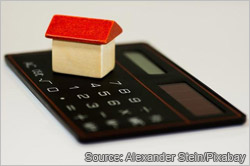Buying a home is already a stressful situation and trying to figure out how you'll pay for it can be even worse. Comparing mortgage lenders, while seemingly an intimidating process, doesn't have to be difficult. Read on for tips on what to pay attention to and how to find the mortgage lender that's right for you.
Terms to know:
- Rates: The mortgage interest rate is either fixed or adjustable. A fixed rate will not change during the length of the mortgage whereas an adjustable rate can fluctuate and change the amount of your monthly payments.
- Points: Points are fees paid to the lender or broker for the loan and are often linked to the interest rate; usually the more points you pay the lower the rate. One point is equal to one percent of the total loan amount. For a $100,000 home, one point would be $1,000. Origination points are paid to the loan officers and discount points are prepaid interest.
- APR: The annual percentage rate (APR) takes into account not only the interest rate, but also points, broker fees and other credit changes you may be required to pay. The APR answers the question: "Is it better to pay more up front to get a lower rate?"
- Fees: While self explanatory, the fees will vary from lender to lender. Each lender will have different names for their fees and each will vary. When gathering information, be sure to inquire about the various fees that will accompany the process of applying for your mortgage.
 Get information from multiple lenders
Get information from multiple lenders
Mortgages are available from several types of lenders - commercial banks, mortgage companies, credit unions and thrift institutions. Different mortgage lenders will quote you different prices, so much like any other comparison shopping you do, it's best to make sure you contact multiple lenders to get the best price.
Cost information
When talking to potential lenders, be sure to ask for information on the same loan type across the board so that you'll have an easier time comparing the lenders. For example, if you're looking for a 30-year fixed-rate mortgage, then have all the lenders provide you information on that type of loan.
Be sure to get information on the rates, fees, points, down payments and
private mortgage insurance. Knowing as much as possible about all the costs involved and not just your monthly payment is imperative to the process of comparing mortgage lenders.
TIP: Be sure to find out the lock-in period for any quotes you may receive. The lock-in period is the length of time that the points and rates will be guaranteed to you. They are usually 30, 45 and 60 days in length. Usually, the longer the period, the higher the price of the loan. The lock-in period should be long enough to allow for settlement before lock-in expires.
Remember that rates change daily so make sure that you are comparing quotes from the same day.
Comparing
Make sure each product you're comparing has the same rate and lock-in period to avoid comparing apples to oranges. Most lenders can offer a variety of combinations for the same loan product and allow you to choose the lock-in period.
Add up the total lender fees for that rate including points and loan related fees. Different lenders may have different names for fees and waive some while still charging others, so the best way to compare is to look at the total sum of all loan-related fees.
The fees can include: underwriting fee, mortgage insurance premium, appraisal fee, the cost of a credit report, tax service fee and more. Points can include a discount and origination points have to be converted into dollar amounts.
Get the best deal you can
Once you know what each lender has to offer, negotiate the best deal that you can. On any given day, lenders and brokers may offer different prices for the same loan to different customers, even if they have the same qualifications as you do. Most likely, the reason for the difference in price is that the loan officers and brokers are often allowed to keep some or all of the difference as extra compensation.
Generally, the difference between the lowest available price for a loan product and any higher price that the borrower agrees to pay is an overage. If there is an overage, it's usually built into the prices quoted to consumers and can occur in both fixed-rate and variable-rate loans and can be in the form of points, fees or the interest rate. No matter if it was quoted to you by a loan officer or a broker, the quote may have overages in it.
Whether this is
your first home or your fifth home, having a few tips for comparing mortgage lenders will make the process go a bit smoother and make the transition from home buyer to home owner a bit easier.